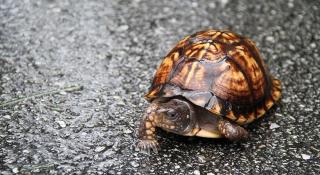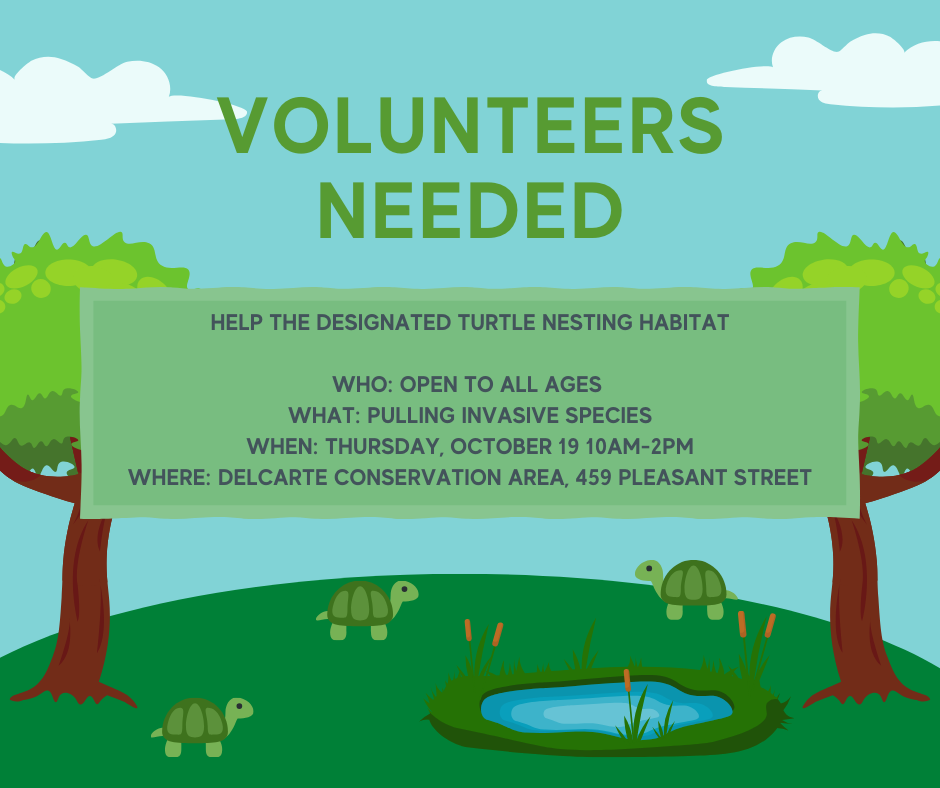Across Massachusetts, spring is the season of movement. Hibernating animals emerge from their winter resting areas in search of food and mates. Turtles are no exception. >From mid-May to early July, thousands of turtles throughout Massachusetts travel to new areas to find food and nest. You may see turtles on roadways, in your backyard, or other unexpected locations as they move across the landscape to find resources they need to survive. Even if it's not apparent to you where they're headed, turtles have a keen sense of direction and may be on their way to wetlands or open, upland sites such as lawns, gravel pits, or roadsides for nesting. If you find a turtle, do not move it far away. |
| Why did the turtle cross the road? |
Protecting adult turtles during this vulnerable time can make a big difference. "Adult turtles can live past 80 years. Young turtles and eggs, on the other hand, have a variety of predators and a low chance of reaching adulthood," says Dr. Mike Jones, MassWildlife State Herpetologist. "This is why it's especially important to protect older adult turtles from cars, especially during this time of year when turtles are crossing roads more frequently." Losing any adult turtles, particularly adult females, is a serious problem that can lead to the eventual local extinction of a population.
What to do if you see a turtle in or near a road:
Be safe. Do not risk getting hurt or causing harm to others by unsafely pulling off the road or trying to dodge traffic. If the opportunity to safely move a turtle from the road occurs, move it in the direction it was heading and off the edge of the road. The turtle is trying to get to habitats and resources it needs and knows. Do not take turtles home or move them to a "better" location; turtles should not be moved more than 100 yards from where they are found.
Handle with care. Most turtles should be grasped gently along the shell edge near the mid-point of the body. However, snapping turtles are fast and have very powerful jaws that can inflict a bad bite. A snapping turtle can reach your hands if you lift it by the sides of its shell. If you must move a snapping turtle, use a broom to coax it into a plastic tub or box. Never lift a snapping turtle only by the tail; this can injure their spine.
Slow down, be observant. Watch for turtles on roadways bordered by wetlands on both sides. These areas are commonly used as crossing points. If you see one turtle crossing, there's a chance that others will be crossing soon as well.
Report busy crossing locations. Let the Town of Franklin - Conservation and MassWildlife know If you see multiple turtles crossing the road or if you see multiple turtles that have been hit by cars. Email location information to natural.heritage@mass.gov and bgoodlander@franklinma.gov.
Spread the word and help protect our native turtles. In addition to five species of sea turtles that frequent our coastal areas, Massachusetts is home to ten native species of terrestrial and aquatic turtles. Six of the 10 species are protected under the Massachusetts Endangered Species Act. Learn more in our native turtles here.
MassWildlife's Natural Heritage & Endangered Species Program. "Why did the turtle cross the road?" Mass.gov, 05/03/2023, https://www.mass.gov/news/why-did-the-turtle-cross-the-road



